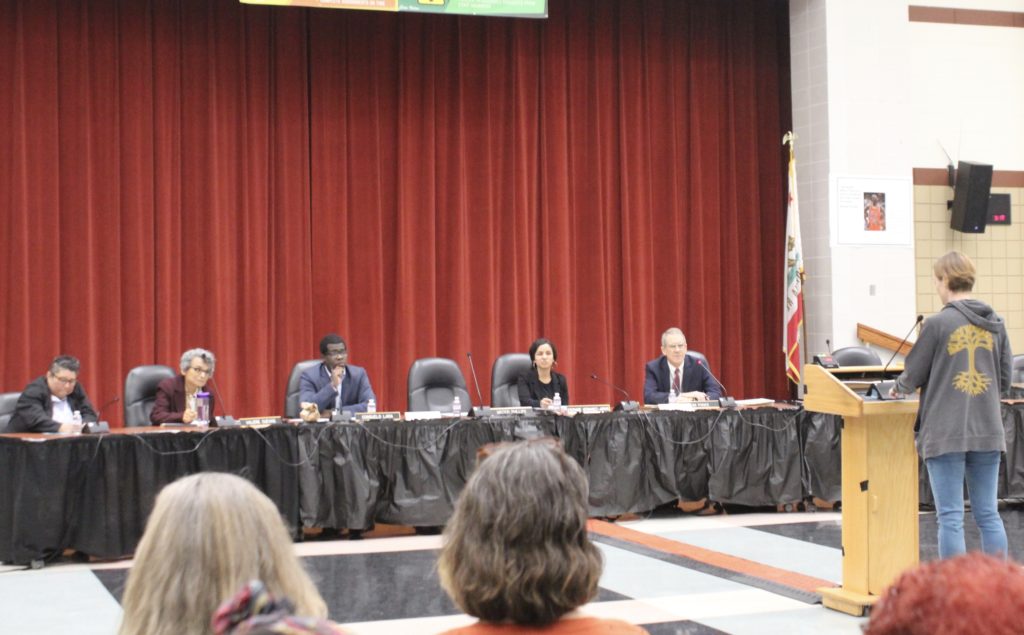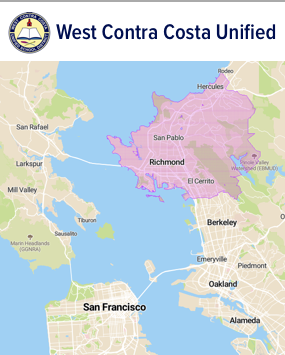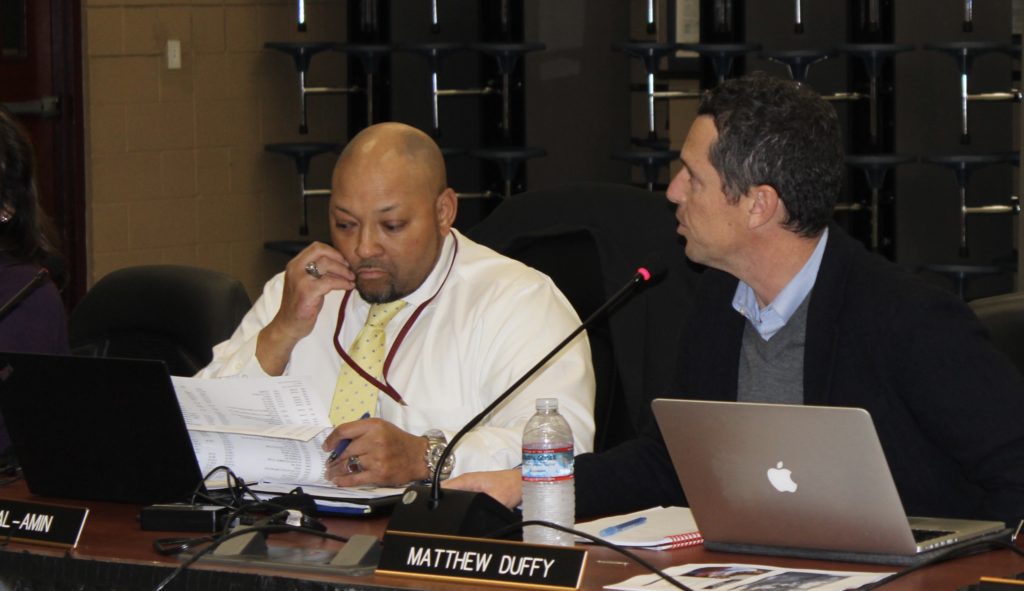
Black teachers: How to recruit them and make them stay

Lessons in higher education: What California can learn

Keeping California public university options open

Superintendents: Well-paid and walking away

The debt to degree connection

College in prison: How earning a degree can lead to a new life

A San Francisco Bay Area superintendent whose job appeared to be in jeopardy was spared from termination after about a dozen community members asked the school board to keep him.
“I thank the board for reviewing my leadership and look forward to continuing the work we are doing on behalf of our students,” said Matthew Duffy, superintendent of West Contra Costa Unified, in a written statement to EdSource on Monday. Duffy was hired to his first job as superintendent in July of 2016.
The possibility of his departure highlighted an ongoing challenge in large districts in California and nationally: retaining superintendents for more than three or four years. According to an EdSource review, 17 superintendents in the state’s largest 30 districts have been in the job for four years or less. Only one has been in the job for more than 10 years — Long Beach’s Chris Steinhauser, who has been superintendent for 17 years.
During the meeting on Friday night, several residents of the district, which includes Richmond and surrounding communities, said Duffy and the board should be held accountable for the district’s deficit, which appears to have ballooned from about $10 million to $48 million since June. But they stressed before a special closed board meeting that now is not the time to fire Duffy for a variety of reasons, including lack of a succession plan or a longtime staff member who could assume leadership of the district as an interim superintendent. Duffy’s cabinet includes three associate superintendents hired or promoted within the last few months and two hired last year.

PTA representative Leslie Reckler said the board needs to plan for succession and treat the superintendent with respect if it expects to attract “best of class” administrative leaders to the district.
“Think about what tonight says about our district and the way we treat our people,” she told board members Friday, adding that they appeared to be publicly humiliating Duffy. “Is this the way we want students to treat one another?…Let him finish the year. Do it the right way.”
Other members of the public said the district would need to conduct a costly search for a new superintendent, which could further destabilize it and drain its resources at a time when it needs to focus all of its attention on solving its deficit.
Sandra Falk, who described herself as a “longtime supporter of the district,” said she and many of her friends who are PTA members urged the board “not to terminate this superintendent, especially not at this time and especially not if it costs one penny of your bare bones budget.” She said the board should bring the community together to solve its problems and “stop spending millions on outside contracts.”
“You need to stop pointing the finger,” she said. “Stop finding a scapegoat and take responsibility for our students and our community.”

Theresa Harrington / EdSource
A sign supporting West Contra Costa Unified Superintendent Matthew Duffy is propped up at a special board meeting Nov. 15, 2019.
After meeting for two-and-a-half hours, Board president Tom Panas emerged from the meeting with the rest of the board to read this statement: “The purpose of the meeting was to consider the performance of the superintendent and to consider if the board would take any action. The board unanimously agrees that it will not take any action at this time.”
Board President @tompanas read the following statement:
The purpose of the meeting was to consider the performance of the superintendent and to consider if the board would take any action.
The board unanimously agrees that it will not take any action at this time.
— West County Schools (@WCCUSD) November 16, 2019
Panas told EdSource after the meeting that “the board really worked as a team this evening,” but he declined to discuss specifics about how or why it decided to keep Duffy at the helm.
Board member Mister Phillips publicly stated before the meeting that he expected the board to discuss the superintendent’s termination, which he opposed. He told EdSource on Monday that “the board made the right decision” and he appreciated the public comments, but he declined to say whether he believed they influenced the board.
The board will meet again Wednesday to discuss its budget options before the district holds community meetings next month asking for input into possible cuts. Short-term, the board could dip into $25 million in reserves and borrow $15.6 million from an irrevocable trust to pay for retiree health benefits this year. That would cover nearly $40 million of the deficit and avoid mid-year cuts. But the district would need to pay back the trust next year and cover an additional $8 million projected in 2020-21.
Tony Wold, who was hired in August as the district’s associate superintendent of business services, is asking the board to determine cuts by identifying which services are considered “base” or “essential” to support instruction and which are considered “auxiliary” that support student achievement. The board has not yet made these determinations.

Theresa Harrington / EdSource
Tony Wold, associate superintendent for business services in West Contra Costa Unified, presents a budget report to the board on Oct. 23, 2019.
“Hard decisions may be required regarding support services” according to a Powerpoint presentation Wold will deliver to the board Wednesday, which is attached to the meeting agenda. Previously identified board and district priorities include: implementing a new English language arts curriculum, expanding dual language immersion programs, increasing support for African-American students, focusing on building positive school climates and supporting the redesign of Stege Elementary school, while also making necessary cuts to achieve balanced budgets for the next three years.
The district’s budget crisis is the result of ongoing deficit-spending since 2016-17, along with increased costs for special education, insurance, goods and services and staffing — including recent pay raises for teachers and other staff — “at percentages higher than revenues received and anticipated,” according to Wold’s presentation. In addition, West Contra Costa — like all districts in the state — is grappling with increased retirement contribution costs. And declining enrollment has caused the district’s per-student funding to drop.

Theresa Harrington / EdSource
West Contra Costa Unified Superintendent Matthew Duffy, right, discusses the district’s budget with John al-Amin, associate superintendent of business services, who resigned in May, during a 2018 board study session.
John al-Amin, the previous associate superintendent of business services who resigned in May, told EdSource on Monday that he showed the superintendent numbers that revealed a deficit of about $20 million before he left, based on the district’s overspending and failing to cut costs sufficiently to pay for teacher raises which went into effect in 2018 and continue to increase through 2021.
In order to present the board with a budget that appeared balanced, the district removed many known expenses in June, then added them back in after the budget was adopted, said al-Amin, who was hired in August, 2018. He said this had also been done in the district in the months before he arrived, but that the previous associate superintendent of business services Christopher Mount-Benites created a separate reserve fund “to force the superintendent’s hand” and require him to seek board approval before dipping into reserves, instead of depleting the district’s unallocated ending fund balance.
“It was done to highlight that we had deficit spending that wasn’t being addressed,” al-Amin said.
When expenses continued to outpace revenues, al-Amin said, “I think everyone was looking for someone to blame.” He said instead of adding expenses after the budget was adopted, the district should have included all known expenses in the original budget presented to the board for approval, along with cuts necessary to balance it.
Regarding the idea of borrowing $15.6 million from the irrevocable trust to cover retiree benefits costs, al-Amin said that’s not something that is routinely done.
“But the reality is given the severity and magnitude of this deficit,” he said, “unless the district is going to make significant reductions, it’s a fund source that could be utilized.”
The board on Wednesday will also discuss possibly placing a $575 million construction bond measure on the March, 2020 ballot to help upgrade or rebuild aging facilities.
Editor’s Note: As a special project, EdSource is tracking developments this year in the Oakland Unified and West Contra Costa Unified School Districts as a way to illustrate some of the most urgent challenges facing many urban districts in California. West Contra Costa Unified includes Richmond, El Cerrito and several other East Bay communities.

Legislation that would remove one of the last tests teachers are required to take to earn a credential in California passed the Senate Education Committee.

Part-time instructors, many who work for decades off the tenure track and at a lower pay rate, have been called “apprentices to nowhere.”

A bill to mandate use of the method will not advance in the Legislature this year in the face of teachers union opposition.

Nearly a third of the 930 districts statewide that reported data had a higher rate of chronic absenteeism in 2022-23 than the year before.
Comments
Comments Policy
We welcome your comments. All comments are moderated for civility, relevance and other considerations. Click here for EdSource's Comments Policy.